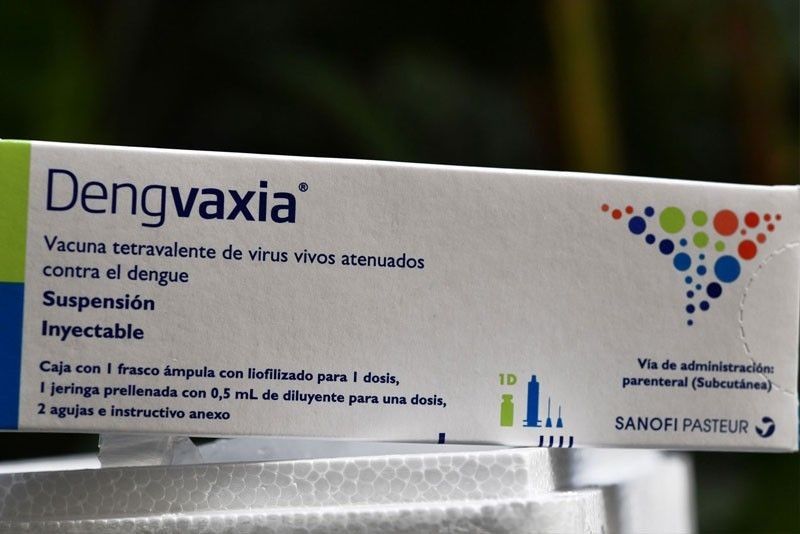Dengvaxia appeal rejected, but options open

MANILA, Philippines — The Department of Health (DOH) has rejected the appeal of pharmaceutical company Sanofi Pasteur to allow Dengvaxia into the local market due to failure to secure requirements.
Sanofi, however, was given the option to reapply at the Food and Drug Administration (FDA) or appeal the decision before the Office of the President.
The DOH upheld an earlier FDA decision to permanently revoke the certificate of product registration (CPR) of the dengue vaccine.
“The efficacy of Dengvaxia itself is not the issue. The decision concerns Sanofi’s complete disregard of FDA regulations, which were precisely put in place by law to ensure (public) safety,” Health Secretary Francisco Duque III said in a decision dated Aug. 19.
Duque explained that Sanofi failed to submit post-approval requirements, which is violation of FDA rules and regulations – a ruling that the company disagreed on.
Dengvaxia, however, could still be re-introduced to the local market in the next months should Sanofi apply for a new CPR or seek administrative remedies such as appealing the decision before President Duterte’s office.
“We are under the Office of the President, so they can file an appeal and the President can reverse our decision,” said Duque, who ruled out the possibility of the vaccine being used for mass immunization.
He said Dengvaxia is not appropriate for outbreak response and cannot also be used for children aged five to nine years who comprised the bulk of dengue patients in the country.
“If this vaccine cannot address the highest percentage of dengue patients, what’s the point? And it is also not cost effective considering that it’s P1,000 per dose,” Duque said.
Aside from filing an appeal, Duque said, Sanofi may also opt to file before the FDA for a new CPR for Dengvaxia.
“In our decision, it is without prejudice to re-application of new CPR if there are other up and coming vaccine against dengue. They just have to go through the process and ensure compliance with FDA rules and regulations,” he explained.
“Our ruling is very clear, they can re-apply and according to the FDA, the process would take three to six months in case this gets re-applied,” the health chief added.
Procedural failures
Duque stressed that the FDA banned Dengvaxia because it failed to comply with the regulations to submit a risk management plan, which ensures the safety and efficacy of the product.
DOH Assistant Secretary Charade Grande said Sanofi submitted only three of the four required versions of its plan. The company, however, insisted that it submitted a periodic update to the FDA.
“But what they submitted is not what’s being required,” Grande pointed out.
Sanofi said it was keen on looking for possible remedies to help the company’s appeal.
“With this, we will thoroughly study all possible remedies available to us under Philippine laws and regulations while keeping in mind the best interest of the Filipinos,” Sanofi said in a statement.
The French pharmaceutical also expressed disagreement with the stipulated violations that the DOH said prompted the denial of public access to Dengvaxia.
Sanofi, however, said it was grateful that the DOH recognized the “safety of Dengvaxia is not on trial” and that there is dire need for a dengue vaccine to be introduced into the market.
It also noted Dengvaxia’s inclusion in the World Health Organization 2019 List of Essential Medicines.
The company vowed to continue working with the Philippine government and local scientific and medical communities in the fight against vaccine-preventable diseases.
Doctors for Truth and Public Welfare expressed disappointment over DOH’s decision, but said it hopes President Duterte takes proper action by allowing Dengvaxia use.
Former health secretary Esperanza Cabral also maintained that there was a need to bring back Dengvaxia to reduce incidence of dengue in the country.
The Dengue Vaccine National Expert Panel has recommended for Sanofi to submit updated data on pharmacovigilance and post-marketing surveillance to show what the company has done in monitoring and preventing Dengvaxia’s adverse effects on 830,000 children vaccinated with the anti-dengue vaccine.
From January to Aug. 3, the DOH has recorded a total of 188,562 dengue cases, including 807 deaths.
- Latest
- Trending



























